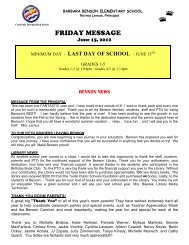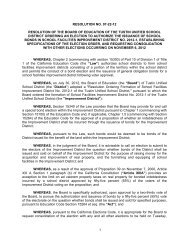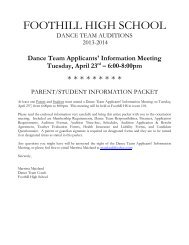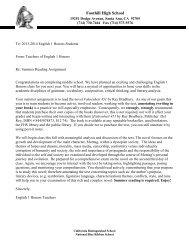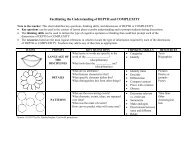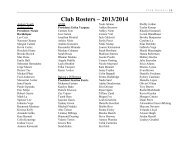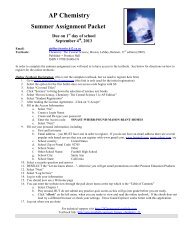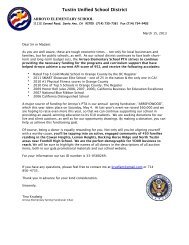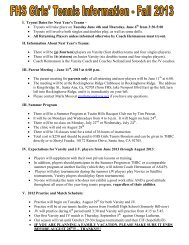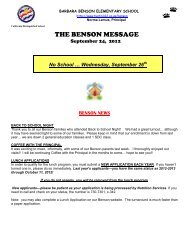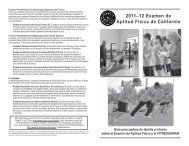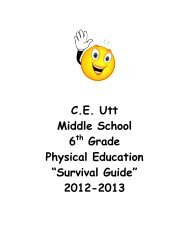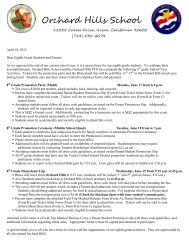College Planning - Tustin Unified School District
College Planning - Tustin Unified School District
College Planning - Tustin Unified School District
Create successful ePaper yourself
Turn your PDF publications into a flip-book with our unique Google optimized e-Paper software.
the college application process<br />
<strong>College</strong> entrance exams<br />
practice exams<br />
There are two tests that help you “rehearse”<br />
for taking college entrance exams—the PSAT/<br />
NMSQT and PLAN. Taking one of these tests will<br />
help you identify strengths and weaknesses in<br />
skills necessary for successful college study.<br />
You can then focus your preparation on those<br />
areas where you could most benefit from<br />
additional study or practice. Your specific test<br />
results are not reported to colleges. However,<br />
you will receive pamphlets, catalogs, and<br />
brochures from colleges interested in students<br />
testing within your range.<br />
The PSAT/NMSQT<br />
PSAT/NMSQT stands for Preliminary Scholastic<br />
Aptitude Test and the National Merit<br />
Scholarship Qualifying Test. It is a standardized<br />
test that helps you practice for taking the SAT<br />
Reasoning Test. The PSAT/NMSQT measures<br />
the following skills:<br />
··<br />
Critical reading<br />
··<br />
Math problem solving<br />
··<br />
Writing<br />
The PSAT/NMSQT is usually taken during<br />
your junior year because the National Merit<br />
Scholarship Corporation uses these scores<br />
to determine eligibility for their scholarship<br />
programs. If you take the test earlier in your<br />
high school career, do not be discouraged<br />
by a low score because the PSAT/NMSQT is a<br />
junior-level test. For more information on the<br />
PSAT/NMSQT, visit the <strong>College</strong> Board website at<br />
www.collegeboard.org/testing.<br />
The PLAN Test<br />
PLAN is a comprehensive program for<br />
sophomores designed to provide a midpoint<br />
assessment of educational progress given<br />
your college and career goals. PLAN is a<br />
145-question, multiple-choice test that<br />
measures academic achievement in English,<br />
math, reading, and science. PLAN is not an<br />
aptitude or an IQ test. Instead, the questions<br />
are directly related to what you learned in your<br />
high school classes.<br />
PLAN also collects information about your<br />
interests, needs, and plans in order to help<br />
you select your remaining high school<br />
courses and plan for your life after high<br />
school. PLAN is linked to the ACT in terms<br />
of content and is scored along the same<br />
score scale. For more information on PLAN,<br />
visit www.actstudent.org/plan.<br />
entrance exams<br />
Many colleges require you to take a college<br />
entrance exam as part of the admissions<br />
process. There are two primary tests, the SAT<br />
Reasoning Test and the ACT, and either test is<br />
generally accepted by colleges for admissions<br />
purposes.<br />
The SAT Reasoning Test<br />
The SAT includes three sections: math, critical<br />
reading, and writing. The questions are geared<br />
toward measuring conceptual thinking, rather<br />
than memorizing facts.<br />
The writing section includes multiple-choice<br />
questions about grammar, usage, and word<br />
choice. Each student will write a short, timed<br />
essay that requires him or her to take a position<br />
on an issue and use examples to support the<br />
position.<br />
The critical reading section includes short<br />
and long reading passages. The math section<br />
includes questions on exponential growth,<br />
absolute value, functional notation, linear<br />
functions, manipulations with exponents, and<br />
properties of tangent lines.<br />
Students taking the SAT will receive three<br />
scores: one each for writing, math, and critical<br />
reading, each on a scale of 200-800.<br />
Students can prepare for the SAT by<br />
reviewing practice questions and taking<br />
an official SAT practice test for free at<br />
www.collegeboard.org.<br />
For a fee, the <strong>College</strong> Board also offers an<br />
online course and study guide.<br />
The ACT<br />
The ACT is a 215-question, multiple-choice<br />
test that measures academic achievement<br />
in English, math, reading, and science. It<br />
measures what you have learned in high<br />
school and your ability to perform tasks that<br />
are frequently required in college coursework.<br />
In addition to the test areas, the ACT includes<br />
an interest inventory to help you choose a<br />
college major and identify jobs you might wish<br />
to explore.<br />
The ACT is not an aptitude or an IQ test.<br />
Instead, the questions are directly related to<br />
what you have learned in your high school<br />
English, math, and science courses.<br />
The ACT test score is based on the number of<br />
correct answers, has no penalty for guessing,<br />
and is measured as an average of the four test<br />
areas in a composite score ranging from 1-36.<br />
An optional Writing Test is available. Check with<br />
the college you plan to attend to determine if<br />
this is one of its testing requirements. This test<br />
measures your writing skills emphasized in<br />
high school English classes and in entry-level<br />
college composition courses. It is a 30-minute<br />
essay asking you to state your position on an<br />
issue from a writing prompt that is provided.<br />
For more information and practice tests, visit<br />
the ACT website at www.actstudent.org.<br />
For a fee, ACT also offers an online test<br />
preparation program.<br />
the sat subject tests<br />
The SAT Subject Tests are one-hour subject<br />
tests with mostly multiple-choice questions.<br />
These tests measure how much you know<br />
about a particular academic subject and how<br />
well you can apply that knowledge. Many<br />
colleges require or recommend one or more<br />
of the SAT Subject Tests for admission or<br />
placement. These tests provide a dependable<br />
measure of your academic achievement and<br />
are a good predictor of future performance.<br />
There are over 20 subject tests that fall into the<br />
following five general subject areas:<br />
··<br />
English<br />
··<br />
Math<br />
··<br />
History<br />
··<br />
Science<br />
··<br />
Languages (includes English Language<br />
Proficiency Test)<br />
For more information, visit<br />
www.collegeboard.org/testing.<br />
7



